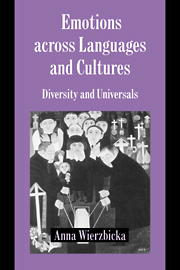Book contents
- Frontmatter
- Contents
- List of figures
- Acknowledgments
- List of abbreviations
- 1 Introduction: feelings, languages, and cultures
- 2 Defining emotion concepts: discovering “cognitive scenarios”
- 3 A case study of emotion in culture: German Angst
- 4 Reading human faces
- 5 Russian emotional expression
- 6 Comparing emotional norms across languages and cultures: Polish vs. Anglo-American
- 7 Emotional universals
- Notes
- References
- Index
3 - A case study of emotion in culture: German Angst
Published online by Cambridge University Press: 22 August 2009
- Frontmatter
- Contents
- List of figures
- Acknowledgments
- List of abbreviations
- 1 Introduction: feelings, languages, and cultures
- 2 Defining emotion concepts: discovering “cognitive scenarios”
- 3 A case study of emotion in culture: German Angst
- 4 Reading human faces
- 5 Russian emotional expression
- 6 Comparing emotional norms across languages and cultures: Polish vs. Anglo-American
- 7 Emotional universals
- Notes
- References
- Index
Summary
“Angst” as a peculiarly German concept
“Angst” is a peculiarly German concept. The fact that this word has been borrowed and is used in English for a different range of situations, highlights the sui generis meaning of the German Angst. Consider, for example, the following sentence from an English novel: “community was replaced by the fleeting, passing contacts of city life; people came into the university, and disappeared; psychiatric social workers were appointed, to lead them through the recesses of their angst” (Bradbury 1975: 64). As this example illustrates, angst in English suggests an existential condition which seems to have to do with a long-term state of deep-seated anxiety and alienation rather than with what is normally called fear. The German word closest to the English fear is not Angst but Furcht; and it is noteworthy that it was not Furcht, but Angst, with its very distinct semantics and its great salience in German culture, that was felt to be needed as a useful loan word.
As is often the case with loan words, however, the English word angst does not mean exactly the same as its German source, but reflects those aspects of the meaning of the German Angst which are particularly striking from an Anglo point of view: its indeterminacy and its “existential nature”. In German, one can speak of “Existenzangst” (cf. e.g. Jaeger 1971: 26) or of the “existentielle Angst” (cf. e.g. Nuss 1993: 189) and “existentielle Ängste” (plural; see e.g. Langenscheidt's Großwörterbuch 1993: 308).
- Type
- Chapter
- Information
- Emotions across Languages and CulturesDiversity and Universals, pp. 123 - 167Publisher: Cambridge University PressPrint publication year: 1999
- 1
- Cited by



